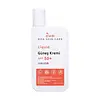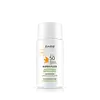What's inside
What's inside
 Key Ingredients
Key Ingredients

 Benefits
Benefits

 Concerns
Concerns

 Ingredients Side-by-side
Ingredients Side-by-side

Water
Skin ConditioningAloe Barbadensis Leaf Juice
Skin ConditioningC12-15 Alkyl Benzoate
AntimicrobialAlcohol Denat.
AntimicrobialGlyceryl Stearate
EmollientBis-Ethylhexyloxyphenol Methoxyphenyl Triazine
Skin ConditioningDiethylamino Hydroxybenzoyl Hexyl Benzoate
UV FilterEthylhexyl Triazone
UV AbsorberButyl Methoxydibenzoylmethane
UV AbsorberIsopentyldiol
HumectantPropanediol
SolventCyclopentasiloxane
EmollientCeteareth-25
CleansingEthylhexyl Salicylate
UV AbsorberDiisopropyl Adipate
EmollientPEG-100 Stearate
Potassium Cetyl Phosphate
EmulsifyingPhenylbenzimidazole Sulfonic Acid
UV AbsorberTriacontanyl Pvp
HumectantCetearyl Alcohol
EmollientPhenethyl Alcohol
MaskingPhenoxyethanol
PreservativeDimethicone/Vinyl Dimethicone Crosspolymer
Skin ConditioningSilica
AbrasiveDimethicone
EmollientSodium Chloride
MaskingTocopheryl Acetate
AntioxidantPanthenol
Skin ConditioningSodium Styrene/Acrylates Copolymer
Sodium Hydroxide
BufferingCetyl Palmitate
EmollientCeteareth-12
EmulsifyingCeteareth-20
CleansingAllantoin
Skin ConditioningRosa Multiflora Fruit Extract
MaskingTetrasodium EDTA
Citric Acid
BufferingCaprylyl Glycol
EmollientPotassium Sorbate
PreservativeSodium Benzoate
MaskingWater, Aloe Barbadensis Leaf Juice, C12-15 Alkyl Benzoate, Alcohol Denat., Glyceryl Stearate, Bis-Ethylhexyloxyphenol Methoxyphenyl Triazine, Diethylamino Hydroxybenzoyl Hexyl Benzoate, Ethylhexyl Triazone, Butyl Methoxydibenzoylmethane, Isopentyldiol, Propanediol, Cyclopentasiloxane, Ceteareth-25, Ethylhexyl Salicylate, Diisopropyl Adipate, PEG-100 Stearate, Potassium Cetyl Phosphate, Phenylbenzimidazole Sulfonic Acid, Triacontanyl Pvp, Cetearyl Alcohol, Phenethyl Alcohol, Phenoxyethanol, Dimethicone/Vinyl Dimethicone Crosspolymer, Silica, Dimethicone, Sodium Chloride, Tocopheryl Acetate, Panthenol, Sodium Styrene/Acrylates Copolymer, Sodium Hydroxide, Cetyl Palmitate, Ceteareth-12, Ceteareth-20, Allantoin, Rosa Multiflora Fruit Extract, Tetrasodium EDTA, Citric Acid, Caprylyl Glycol, Potassium Sorbate, Sodium Benzoate
Water
Skin ConditioningDicaprylyl Carbonate
EmollientEthylhexyl Methoxycinnamate
UV AbsorberPropanediol
SolventSilica
AbrasiveNiacinamide
SmoothingDibutyl Adipate
EmollientButyl Methoxydibenzoylmethane
UV AbsorberEthylhexyl Triazone
UV AbsorberBis-Ethylhexyloxyphenol Methoxyphenyl Triazine
Skin ConditioningC20-22 Alkyl Phosphate
EmulsifyingC20-22 Alcohols
Emulsion StabilisingBenzotriazolyl Dodecyl P-Cresol
UV AbsorberCarnosine
Skin ConditioningTocopherol
AntioxidantParfum
MaskingCaprylyl Glucoside
CleansingSodium Gluconate
Skin ConditioningXanthan Gum
EmulsifyingPolyacrylate Crosspolymer-6
Emulsion StabilisingBHT
AntioxidantSodium Hydroxide
BufferingO-Cymen-5-Ol
AntimicrobialWater, Dicaprylyl Carbonate, Ethylhexyl Methoxycinnamate, Propanediol, Silica, Niacinamide, Dibutyl Adipate, Butyl Methoxydibenzoylmethane, Ethylhexyl Triazone, Bis-Ethylhexyloxyphenol Methoxyphenyl Triazine, C20-22 Alkyl Phosphate, C20-22 Alcohols, Benzotriazolyl Dodecyl P-Cresol, Carnosine, Tocopherol, Parfum, Caprylyl Glucoside, Sodium Gluconate, Xanthan Gum, Polyacrylate Crosspolymer-6, BHT, Sodium Hydroxide, O-Cymen-5-Ol
 Reviews
Reviews

Ingredients Explained
These ingredients are found in both products.
Ingredients higher up in an ingredient list are typically present in a larger amount.
You might know this ingredient as Tinosorb S or Bemotrizinol. It is a UV filter that covers both UVA and UVB rays.
This ingredient has two peak UV absorption peaks ( 310 and 340 nm) and is able to absorb both UV-A and UV-B rays. This ingredient works by preventing UV rays from reaching and damaging your skin.
On top of that - it is highly photostable and helps prevent the photodegration of other sunscreen ingredients such as avobenzone.
Tinosorb S is allowed in the EU, Australia, and Asia. It is close to being approved by the FDA and we'll hopefully get this ingredient in the U.S. by late 2025.
Fun fact: Tinosorb S is the most effective UV absorber at maximum concentration (measured by SPF) permitted in the EU.
This ingredient is oil-soluble, so your oil-cleansers will take this right off at night.
Learn more about Bis-Ethylhexyloxyphenol Methoxyphenyl TriazineAlso known as Avobenzone, this ingredient is a chemical sunscreen filter that provides protection in the UV-A range.
Avobenzone is globally approved and is the most commonly used UV-A filter in the world.
Studies have found that avobenzone becomes ineffective when exposed to UV light (it is not photostable; meaning that it breaks down in sunlight). Because of this, formulations that include avobenzone will usually contain stabilizers such as octocrylene.
However, some modern formulations (looking at you, EU!) are able to stabilize avobenzone by coating the molecules.
Avobenzone does not protect against the UV-B range, so it's important to check that the sunscreen you're using contains other UV filters that do!
The highest concentration of avobenzone permitted is 3% in the US, and 5% in the EU.
Learn more about Butyl MethoxydibenzoylmethaneEthylhexyl Triazone is a modern chemical sunscreen that protects from UV-B radiation.
It is the most effective of existing UV-B filters, as it provides the highest level of photo-stable absorption. It protects from the entire UV-B range (280 to 320nm), with it's highest level of protection at 314nm.
Ethylhexyl Triazone is oil soluble, oderless and colorless, which mean it is able to be incorporated into a variety of different formulations.
It is not currently available within the United States due to slow changing FDA regulations. Outside of the US, it is used in formulations at concentrations up to 5%.
Learn more about Ethylhexyl TriazonePropanediol is an all-star ingredient. It softens, hydrates, and smooths the skin.
It’s often used to:
Propanediol is not likely to cause sensitivity and considered safe to use. It is derived from corn or petroleum with a clear color and no scent.
Learn more about PropanediolSilica, also known as silicon dioxide, is a naturally occurring mineral. It is used as a fine, spherical, and porous powder in cosmetics.
Though it has exfoliant properties, the function of silica varies depending on the product.
The unique structure of silica enhances the spreadability and adds smoothness, making it a great texture enhancer.
It is also used as an active carrier, emulsifier, and mattifier due to its ability to absorb excess oil.
In some products, tiny microneedles called spicules are made from silica or hydrolyzed sponge. When you rub them in, they lightly polish away dead skin layers and enhance the penetration of active ingredients.
Learn more about SilicaSodium Hydroxide is also known as lye or caustic soda. It is used to adjust the pH of products; many ingredients require a specific pH to be effective.
In small amounts, sodium hydroxide is considered safe to use. However, large amounts may cause chemical burns due to its high alkaline.
Your skin has a natural pH and acid mantle. This acid mantle helps prevent harmful bacteria from breaking through. The acid mantle also helps keep your skin hydrated.
"Alkaline" refers to a high pH level. A low pH level would be considered acidic.
Learn more about Sodium HydroxideWater. It's the most common cosmetic ingredient of all. You'll usually see it at the top of ingredient lists, meaning that it makes up the largest part of the product.
So why is it so popular? Water most often acts as a solvent - this means that it helps dissolve other ingredients into the formulation.
You'll also recognize water as that liquid we all need to stay alive. If you see this, drink a glass of water. Stay hydrated!
Learn more about Water